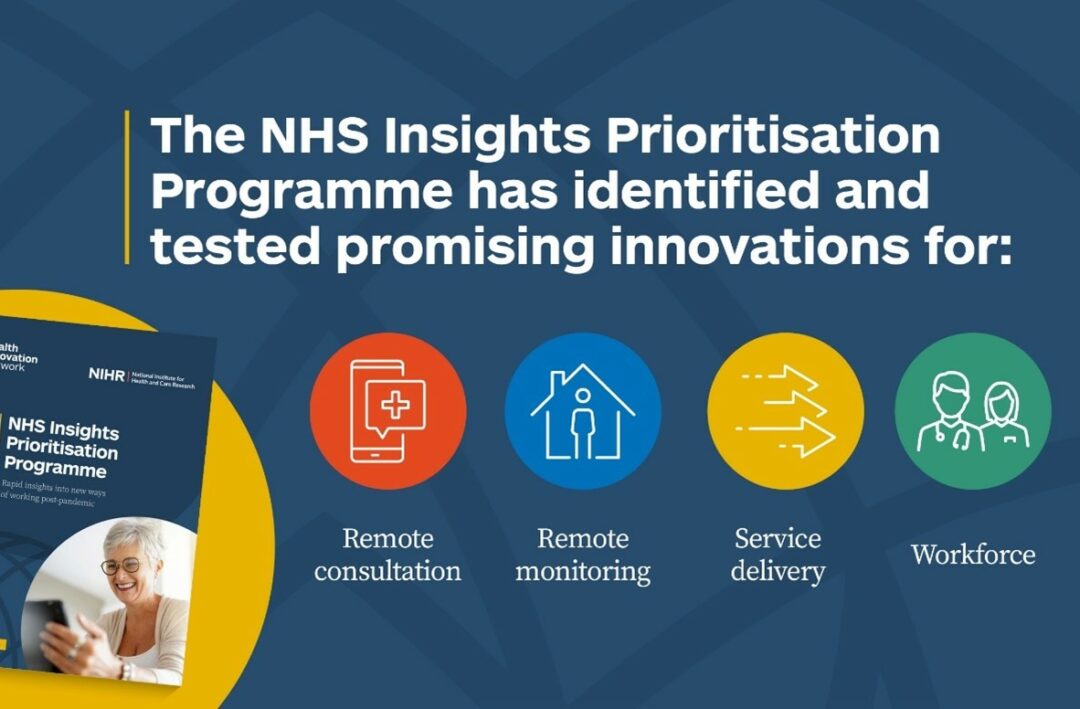Unique research collaboration highlights innovative approaches for post-pandemic healthcare
News

Unique research collaboration highlights innovative approaches for post-pandemic healthcare
A new report has outlined the findings of 14 projects which identified and tested promising innovations to support post-pandemic ways of working in the NHS.
The NHS Insights Prioritisation Programme was launched in 2021 to contribute to the recovery from COVID-19, build resilience and deliver benefits to patients.
Health innovation networks (HINs) and the National Institute for Health and Care Research (NIHR) Applied Research Collaborations (ARCs) teamed up for the projects, benefitting from each other’s unique skills and links with system partners. Each project received a share of £4.2m funding from NHS England (NHSE) and the Accelerated Access Collaborative (AAC).
The partnerships tested and evaluated innovative approaches within their local Integrated Care Systems (ICSs). Each project focused on four priority areas:
In the North East and North Cumbria, the region’s Health Innovation Network (HIN) and Applied Research Collaboration (ARC) teamed-up to evaluate the impact of a video intervention to reduce opioid prescribing.
Opioid use in the North East is high. A video messaging pilot-intervention was developed and implemented, in response to the pandemic, to explain the rationale for opioid reduction and encourage people to seek support. This study set out to evaluate the potential benefits, risks, and economic consequences of ‘at scale’ implementation of the video messaging service.
You can read more about the pilot and the findings from the evaluation, here.
Read the NIPP summary report and individual findings for each project.
The COVID-19 pandemic acted as a disruptor and accelerator of innovation. By demonstrating its resilience and ability to make changes rapidly, the NHS has been able to learn from the pandemic and future-proof services.
Richard Stubbs, Chair of The Health Innovation Network, explains:
The NHS Insights Prioritisation Programme has provided a rapid analysis of some of the most promising health and care innovations across the country in real-world settings. These findings and recommendations will help Integrated Care Systems understand how they might implement these new approaches in their local system.’
An independent evaluation of the programme concluded that NIPP had been successful in facilitating a structured approach for the funding and acceleration of innovations and interventions, building on previous initiatives, such as the NHS Beneficial Changes Network.
It also noted that the programme had cemented existing relationships between Health Innovation Networks and NIHR ARCs, which may lead to more joint working in future.
Professor Dame Nicky Cullum, Chair of the NIHR Applied Research Collaborations, adds:
‘The collaboration between the health innovation networks and the NIHR Applied Research Collaborations has enabled us to deliver practical insights that address changing health and care needs post-pandemic. We hope this learning will help health and care teams, and benefit our communities.’
The full evaluation is available here, together with the project and executive summary reports, and links to a series of podcasts and blogs about the programme.
Blog: AHSNs and ARCs – the perfect partnership
Research Fellow Dr Yu (Maggie) Fu worked jointly between the Applied Research Collaboration and Academic Health Science Network (the former name for HIN) for the North East and North Cumbria.
In this blog, she shares her experiences of working on a number of shared research projects.
The perfect partnership: ARCs and AHSNs – The Health Innovation Network